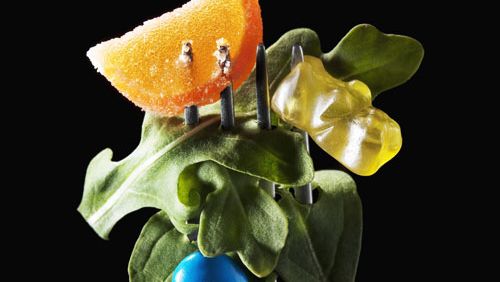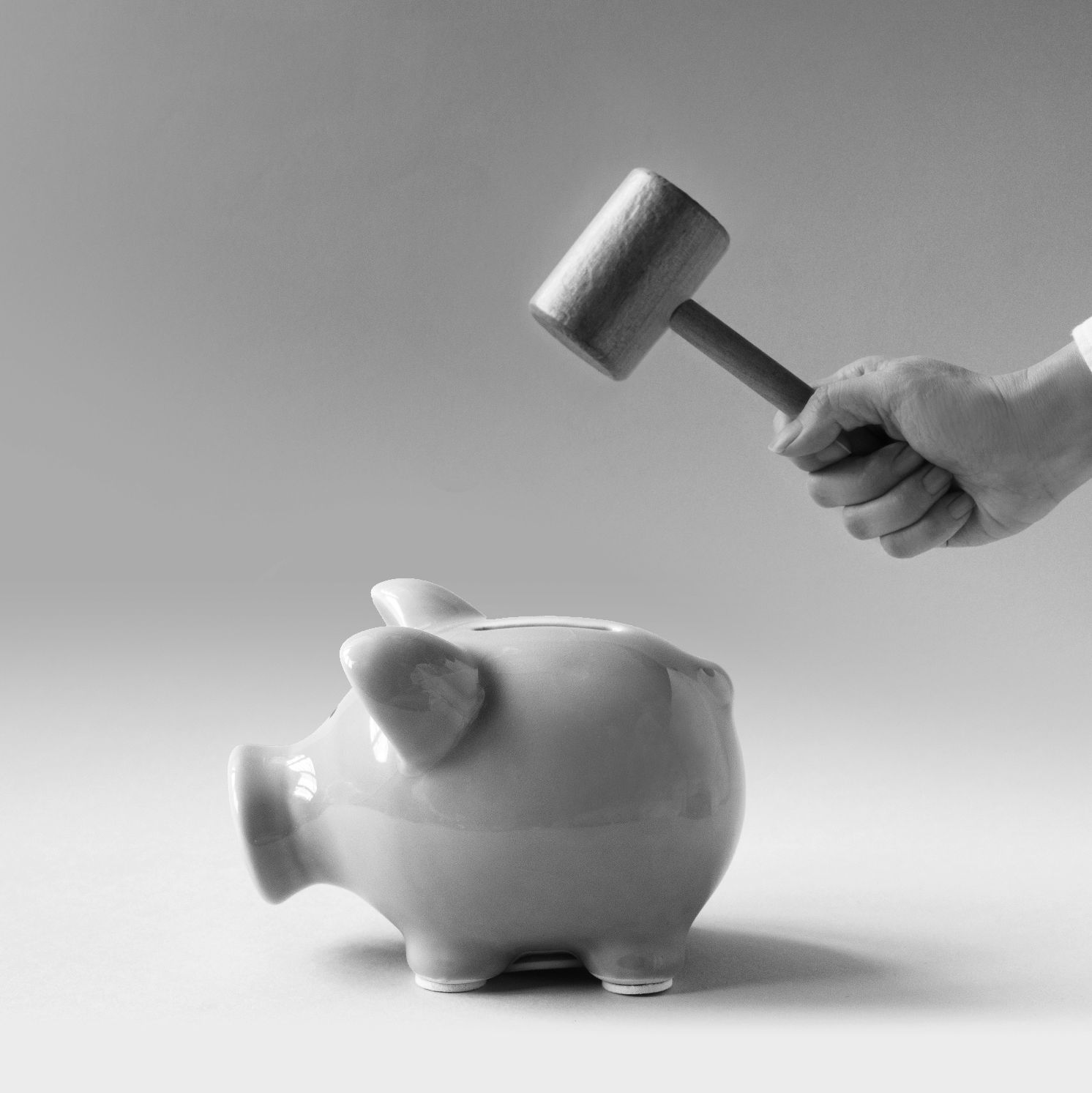Meet the Forkers
Frenchwomen are obsessed with the latest diet — le forking, as it's known in fashionably slim circles. By eating only what you can spear with a fork, it's easy to drop pounds without ever feeling hungry.

I have never been a fad dieter, mostly because I have no sense of discipline. But I have known many fad dieters. I once worked for a woman who ate only white food; I was an assistant, and I remember frantically removing pieces of offending brown bread from sandwiches before one business lunch, hyperventilating with anxiety. I worked with another who wouldn't eat as long as the sun was in the sky (and trust me, it wasn't Ramadan and she wasn't Muslim). I won't even catalog the friends who've suffered through various cleanses.
On the face of it, the Fork Diet (or Le Forking, as the Parisians call it) seems no crazier than any other diet. It's certainly straightforward. The sole rule: You may eat only what you can pick up with your fork. Simple. And with the goal of dropping a few quick pounds, I figured it was an ideal fix.
The quirky eating program debuted in France in a book called Dîne Avec Une Fourchette (details available on forkitdiet.com); it's become a sensation on the Continent and in the U.K. Here in the States, it's the latest path to achieving French thinness. How can one nationality eat so much butterfat and chocolate, yet stay so svelte? Sure, over there the chocolate is balanced by vegetables, fructose isn't considered a primary food group, and the portions are a fifth of what you get at a U.S. restaurant, but it's hard to resist Le Forking's allure — if it's a French diet, it must work, at least a little. Right?
I began my Le Forking experiment after a trip to Martha's Vineyard, where my kind hosts seemed to go out of their way to serve things that couldn't be eaten with a fork (corn on the cob! Chowder!) — an eye-opener as to how challenging this plan could be. There is a wimp and a hard-core version of the diet. On the wimp version, you can use a knife to prepare your meal. You're also allowed to go wild and splurge on items like chicken, turkey, shrimp, lobster, and omelets. In the hard-core version, no knives are allowed. This means, additionally, no finger foods (breads, cheeses, fresh fruits); no spoon foods (soups, stews, yogurts, cereals, cooked fruits); and no foods that must be spread (hummus, soft cheese, ketchup, mustard) or cut (most meats). And Le Forking does not look kindly on pumpkin, avocado, or artichoke hearts.
For the most part, I'm a healthy eater. Even so, I knew that when I chose the hard-core version, I was dooming myself to two weeks of grouchiness and repetition. I go to the gym a lot, and I eat granola in the morning. That had to go. So did my pretraining snacks of almonds and hard-boiled eggs. Giving up fruit was the hardest. We all know that too much fruit leads nowhere good, but I was craving crisp apples and deliciously sweet figs.
I went to Whole Foods for groceries, stopping to gaze at the stacks of purple figs the way some women look at shoes. Back home, I had my first Le Forking dinner: three ounces of poached salmon with green beans and plum tomatoes (yes, a fruit, but I made an exception). Calorically, it wasn't so different from my go-to healthy dinners, but the new meal was satisfying, and it was up to Le Forking standards. For breakfast the next day, I had three egg whites, scrambled, and for lunch, a salad — romaine, lots of red onions, cubed chicken (if someone else does the cutting, does it count?!), tomatoes, walnuts, and olive oil. For dinner, salmon again. For breakfast, egg whites. And on and on, for 42 meals. At the end of two weeks, I'd lost 4 pounds and never wanted to see another piece of salmon in my life. I'd also developed a near fetish for avocados, whose perfect soft texture I could all but feel on my palate in unbidden moments.
So does Le Forking work? Sure. Like all fad diets, its reductiveness takes the thinking out of eating. You can't spear it with a fork? You can't eat it. The diet also doesn't allow snacking. And if you're a social person — a drinker, which I'm not; a partygoer, which I'm definitely not — Le Forking will not offer much of Le Fun. But it does allow for more socially acceptable behavior than, say, the Master Cleanse. As anyone who's been unlucky enough to have lunch with someone on a cleanse can attest, seeing your dining partner sip from a plastic bottle of liquid that's close in color and texture to day-old pureed broccoli does not an enjoyable meal make. So bravo to Le Forking, which doesn't, at least, turn you into a spectacle or a killjoy.
Stay In The Know
Get exclusive access to fashion and beauty trends, hot-off-the-press celebrity news, and more.
But like all diets, Le Forking is also needlessly, sometimes senselessly, restrictive. Follow it literally and out go plenty of healthy options: sashimi, hard-boiled eggs, edamame — in fact, virtually all Asian food, a dietary mainstay of mine, since it's eaten with chopsticks or by hand. Le Forking is also deeply boring. Part of this must be attributable to the fact that I'm quite an uninspired cook, but the fundamental problem with boring diets is that eventually you rebel. The duller the diet, the more disastrous the rebellion.
It remains to be seen how long the effects will last. Le Forking does make you mindful of how you eat, but it also makes you crave, well, different utensils. And as Le Forking adherents know, a knife is the first step on the slippery slope to ruin. So far, the signs are not promising. The day after my stint as a Forker ended, I went to my favorite local sushi restaurant. "Wow," said my friend dryly, watching me devour his edamame, "you're really enjoying that." Then my platter of fresh sashimi arrived, no salmon in sight. But as I picked up a piece of mackerel, I had a revelation: Why not the Chopsticks Diet? You'd eat only what you could snare with chopsticks. I wouldn't be Draconian about it — anything you could grasp would be acceptable. When I was little, I learned how to use chopsticks by plucking M&Ms from a slippery bowl. For sentiment's sake, if nothing else, how could I deny someone else the same pleasure?
-
 Let's Go, PPG, Fans! A New Peacock Series Starring the 'Love Island USA' Season 6 Cast Is Coming Soon
Let's Go, PPG, Fans! A New Peacock Series Starring the 'Love Island USA' Season 6 Cast Is Coming SoonWe're already clearing our summer schedules for 'Love Island: Beyond the Villa.'
By Quinci LeGardye
-
 Why Princess Diana Didn't Move to America
Why Princess Diana Didn't Move to AmericaThe late royal's friend opened up about the princess's American dream.
By Kristin Contino
-
 Anne Hathaway Doubles Down on Luxury's Favorite Neutral
Anne Hathaway Doubles Down on Luxury's Favorite NeutralShe painted herself in the timeless hue.
By Kelsey Stiegman
-
 Senator Klobuchar: "Early Detection Saves Lives. It Saved Mine"
Senator Klobuchar: "Early Detection Saves Lives. It Saved Mine"Senator and breast cancer survivor Amy Klobuchar is encouraging women not to put off preventative care any longer.
By Senator Amy Klobuchar
-
 I'm an Egg Donor. Why Was It So Difficult for Me to Tell People That?
I'm an Egg Donor. Why Was It So Difficult for Me to Tell People That?Much like abortion, surrogacy, and IVF, becoming an egg donor was a reproductive choice that felt unfit for society’s standards of womanhood.
By Lauryn Chamberlain
-
 The 20 Best Probiotics to Keep Your Gut in Check
The 20 Best Probiotics to Keep Your Gut in CheckGut health = wealth.
By Julia Marzovilla
-
 Simone Biles Is Out of the Team Final at the Tokyo Olympics
Simone Biles Is Out of the Team Final at the Tokyo OlympicsShe withdrew from the event due to a medical issue, according to USA Gymnastics.
By Rachel Epstein
-
 The Truth About Thigh Gaps
The Truth About Thigh GapsWe're going to need you to stop right there.
By Kenny Thapoung
-
 The High Price of Living With Chronic Pain
The High Price of Living With Chronic PainThree women open up about how their conditions impact their bodies—and their wallets.
By Alice Oglethorpe
-
 I Used to Imagine Murdering the Men I Dated
I Used to Imagine Murdering the Men I DatedFalling in love helped me finally figure out why.
By Jessica Amento
-
 60 Workout Apps for Women Who Want Results (Without a Gym Membership)
60 Workout Apps for Women Who Want Results (Without a Gym Membership)Buying Guide Easy fitness plans you can follow without fear of judgment.
By Bianca Rodriguez